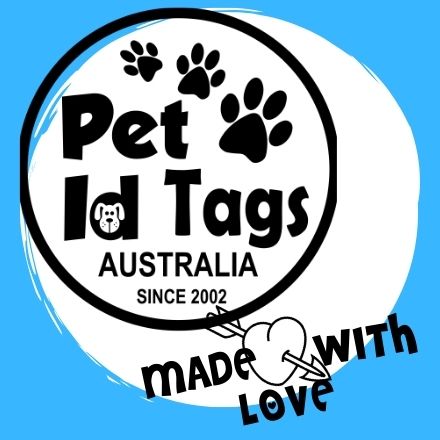If you’re a dog owner in Australia, one of your most important responsibilities is making sure your furry friend can always be identified if they ever go missing. While microchipping is mandatory across the country, a dog ID tag is still one of the quickest and easiest ways for someone to help reunite you with your pet. But what exactly is legally required on a dog tag in Australia? Do the laws vary by state? And what extra details should you include to make your dog’s tag as helpful as possible?
In this guide, we’ll cover the legal requirements, recommended information, and best practices so you can keep your pet safe and compliant.
Why Dog Tags Are Essential
Dog tags serve as the first point of contact if your dog ever wanders off. While microchips are crucial, they can only be scanned by a vet, shelter, or council officer. A visible dog ID tag means any member of the public can instantly contact you without special equipment. This often leads to a faster, less stressful reunion.
For this reason, pet ID tags remain a legal requirement in many places across Australia.
National Laws vs State Laws
Australia doesn’t have a single national law covering dog tags. Instead, each state or territory sets its own rules for pet identification. What is legally required on a dog tag in New South Wales may differ slightly from what’s required in Queensland or Victoria.
The one thing all states agree on: dogs must be microchipped and registered with your local council. On top of that, most states require dogs to wear a collar with an identification tag whenever they are in public.
What is Legally Required on a Dog Tag? (By State)
Here’s a breakdown of what Australian states and territories typically require:
New South Wales (NSW)
-
Dogs must wear a collar and tag when in public.
-
The tag should clearly show the owner’s name and address or phone number.
Victoria (VIC)
-
Dogs must wear a registration tag issued by the local council.
-
Owners are also encouraged to add a personal tag with their contact details.
Queensland (QLD)
-
Dogs in public must wear a collar with a tag or label attached.
-
The tag should include the owner’s name and address or phone number.
South Australia (SA)
-
Dogs must wear a council-issued registration disc.
-
A personal ID tag with contact details is strongly recommended.
Western Australia (WA)
-
All dogs must wear a registration tag provided by the local council.
-
Adding a personalised ID tag with your phone number is highly advised.
Tasmania (TAS)
-
Dogs must wear a council registration tag.
-
A personal ID tag with owner contact details is recommended for safety.
Australian Capital Territory (ACT)
-
Dogs must wear a registration tag.
-
Owners should also add a personal ID tag with a phone number.
Northern Territory (NT)
-
Requirements may differ depending on the local council.
-
Most councils require dogs to wear a registration tag.
The Minimum Legal Requirement
Across most of Australia, the minimum legal requirement for a dog tag is:
-
Council registration tag (issued when you register your dog).
-
Owner’s name and contact details (on a separate engraved dog ID tag).
At the very least, you must display your dog’s registration tag when in public. However, relying only on the council tag isn’t enough—if your dog goes missing outside business hours, a good Samaritan won’t be able to contact the council. That’s why adding a personalised dog tag with your details is strongly recommended.
What You Should Include on a Dog Tag (Best Practice)
While the law only requires minimal details, the more information you provide, the easier it will be to get your dog home safely. Here’s what we recommend engraving on your pet ID tag in Australia:
-
Dog’s name – Helps strangers call your dog calmly.
-
Your phone number – The fastest way to reach you.
-
Secondary phone number – In case you’re unreachable.
-
Your suburb or postcode – Gives a quick idea of where the dog belongs without disclosing your full address.
-
Medical needs – For example, “Needs daily medication” or “Deaf.”
What Not to Put on a Dog Tag
While it’s tempting to include everything, some details are best avoided:
-
Full home address – Can be a security risk.
-
Excessive personal information – Keep it simple and practical.
-
Too many words – A cluttered tag is hard to read.
Dog Tag Designs That Meet Legal Requirements
When choosing a dog tag, make sure it is:
-
Durable – Stainless steel, brass, or anodised aluminium last longest.
-
Easy to read – Clear engraving that won’t wear off quickly.
-
Securely attached – Use a strong split ring to prevent loss.
At Pet ID Tags Australia, we offer a wide range of engraved dog tags that are fully customisable, durable, and stylish. Each tag is made to last and ensures your pet stays compliant with local laws.
Penalties for Not Following the Law
Failing to comply with local dog identification laws can lead to:
-
Fines from your council (these vary but can be hundreds of dollars).
-
Difficulty reclaiming your dog if it ends up at a shelter or pound.
-
Increased risk of permanent loss if your dog goes missing.
The small investment in a quality dog ID tag is well worth avoiding these consequences.
Quick Checklist for Dog Owners
Before heading out with your pup, ask yourself:
-
Is my dog wearing their council registration tag?
-
Do they have a personalised ID tag with my phone number?
-
Is the tag legible and securely attached?
-
Have I updated the tag if my phone number or address has changed?
If you can tick all these boxes, your dog is not only legally compliant but also much safer.
Final Thoughts
So, what is legally required on a dog tag in Australia? The answer depends on your state, but the basics are clear: your dog must wear a council-issued registration tag, and it’s strongly advised to add a personal ID tag with your name and contact number.
While microchipping is mandatory, a simple engraved tag remains the quickest and easiest way to reunite a lost dog with their family. At Pet ID Tags Australia, we make it easy to order a tag that meets legal requirements, looks great, and keeps your furry friend safe.



